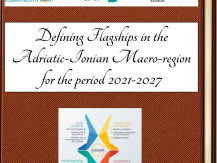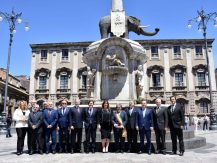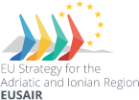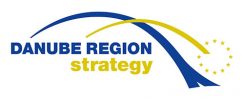Towards the Green Infrastructure – EU Environment Programme Programe for Accession (EPPA) workshop report and conclusions
Green Corridors improve the ecological situation and reduces flood risk and drought damage. Blue Corridors noticeably improve the ecological status of the sea and the coast. The Slovenian presidency of EUSAIR hopes to accelerate this approach and declare new marine protected areas.
The regional workshop on “Green Infrastructure and Ecological Connectivity” took place on 24-25 June 2020, via live video conference. The workshop was organized in cooperation with TAIEX, and under the EPPA project work programme, activity 5.1.1 “Support for the implementation of the EUSAIR and EUSDR activities in the area of nature protection and biodiversity”.
The participants of the workshop came from the relevant authorities of the EPPA beneficiaries involved in the development of a green infrastructure and ecological connectivity under the project. They represented the relevant Ministries (with the environment portfolio) and nature conservation institutes or environment protection agencies of Albania, Bosnia and Herzegovina, Montenegro, North Macedonia, and Serbia. Kosovo* participated with observer status. Details are available in the list of participants.
Civil society was represented by NGOs from the beneficiaries, namely: Environmental Center for Development, Education and Networking (Albania), LIR Evolution (Bosnia and Herzegovina), Center for Protection and Research of Birds (Montenegro), and Macedonian Green Centre (North Macedonia).
EU Delegations’ representatives in Albania, Bosnia and Herzegovina, Kosovo*, Montenegro, North Macedonia, and Serbia also attended.
Mr. Senad Oprašić, TSG 3 cooridnator, presented EUSAIR activities under the topic Transnational Terrestrial Habitats and Biodiversity. He stated EUSAIR activities, and the current workshop help non-EU countries to have a better understanding of the implementation of EU policy in the area of nature and biodiversity, as well as EU Biodiversity Strategy 2020, EU Strategy on Green Infrastructure and Habitat Directive. This topic is important for the region’s future work, and the information provided in the workshop will be useful for non–EU Countries.
EUSAIR lunched in 2014 and since that period has reached some positive results. EUSAIR, via pillar 4, covers key topics for the improvement current situation on each of pillars, and particularly in the sense of sustainable development. In the capacity of Co-coordinator of Pillar 3 (Environmental Quality), Mr. Senad Oprašić expressed his gratitude to the EU for launching the macroregional strategy.
Pilar 3 has two pivotal areas: the marine environment (the first pivotal topic of the macro-regional strategy in terms of environmental quality), and transnational terrestrial habitats and biodiversity (the second pivotal topic of the macro-regional strategy).
The second pivotal topic is important for the workshop, and it is in real connection with the ecological connectivity and Green Infrastructure, that was discussed many times at the TSG 3 meetings. EUSAIR also presented blue and green corridors, as work topics and proposed some projects for implementation.
EUSAIR prepared 4 mono-pillar projects and 2 interpillar projects, trying to include all countries in the project activities, where it is possible, since there are two landlocked countries, the Republic of Serbia and the Republic of North Macedonia, especially in the area of Transnational terrestrial habitats and Biodiversity, via project proposal titled: “Development and drafting a joint plans for cross-border habitats and ecosystem management, and joint plans for managing big carnivores”. This project proposal is discussed among other countries and adopted by consensus.
Since the Republic of North Macedonia join to the EUSAIR October 2019, it is expected it will approve and join the development of the project proposal. It is important to note that there was active participation and support of non-EU countries. EUSAIR expects the project implementation to happen without any problems.
It is important to raise a question regarding pollution in non–EU countries. There are a lot of illegal landfills, litter in the riverbanks, etc., which will result in more of plastic and microplastic, increasing the global problem of marine litter. It is necessary to clean the region and keep it clean. Without that, the region cannot realistically implement EU politics such as the Green Deal, the Biodiversity Strategy, and other strategic documents.
Mr. Mitja Bricelj, TSG 3 coordinator, presented the vision EUSAIR is seeking to achieve. EUSAIR seeks to bring together environment and sustainable development in the Adriatic and Ionian region with blue and green corridors. Ecological connectivity is key to ensure a general good ecological status. The corridor approach dates from 2016 and it aimed to provide the infrastructure to develop priority transboundary activities for the region. In addition, EUSAIR sough synergies between all its pillars and used data from all participating countries to avoid possible conflicts. The same methodology is still in use. The result has been a high consensus level in the Strategy’s governance creating as an output 4 priority projects from the environmental pillar. The projects deal with transboundary Integrated Coastal Zone Planning and marine spatial planning in the Adriatic and Ionic region. EUSAIR is doing its best to recognize the problems and pressures in the region and to take that into account into its planning, as well as policy developments like the EU Green Deal. There are also projects in progress that already integrate green infrastructure on land and river basin management with coastal and marine concerns.
With the approach above, EUSAIR is servicing the needs of the users of the international river basins in the western Balkans and using good practices in the Adriatic and Ionian region. The approach also reveals the synergies between the macroregional strategies (Alpine, Danube, Adriatic, and Ionian) where products are delivered through transboundary projects that involve the local communities. It provides a bottom up approach, that benefits the users of coastal and marine resources, using solutions that respect green infrastructure and connectivity. The Slovenian presidency of EUSAIR hopes to accelerate this approach and declare new marine protected areas.
Find the Event Report on EPPA Regional Workshop on Green Infrastructure and Ecological Connectivity here.
You might be interested in

EUSAIR flagships all summed up!

3rd EUSAIR Annual Forum – CATANIA DECLARATION

The Hellenic Republic assumes the Presidency of the EU Strategy for the Adriatic and Ionian Region (EUSAIR) (1 June 2024 – 31 May 2025)








